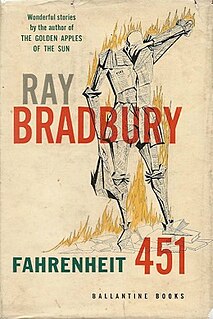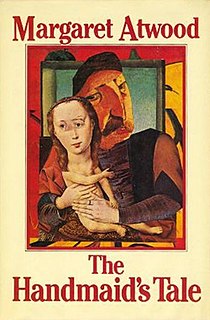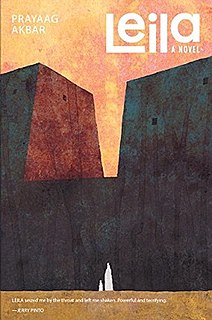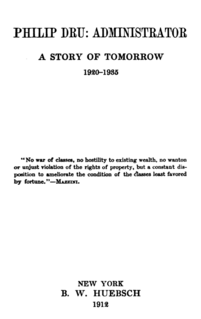 W
WAnimal Farm is an allegorical novella by George Orwell, first published in England on 17 August 1945. The book tells the story of a group of farm animals who rebel against their human farmer, hoping to create a society where the animals can be equal, free, and happy. Ultimately, however, the rebellion is betrayed, and the farm ends up in a state as bad as it was before, under the dictatorship of a pig named Napoleon.
 W
WBrave New World is a dystopian social science fiction novel by English author Aldous Huxley, written in 1931 and published in 1932. Largely set in a futuristic World State, whose citizens are environmentally engineered into an intelligence-based social hierarchy, the novel anticipates huge scientific advancements in reproductive technology, sleep-learning, psychological manipulation and classical conditioning that are combined to make a dystopian society which is challenged by only a single individual: the story's protagonist. Huxley followed this book with a reassessment in essay form, Brave New World Revisited (1958), and with his final novel, Island (1962), the utopian counterpart. The novel is often compared to George Orwell's Nineteen Eighty-Four.
 W
WThe Circle is a 2013 dystopian novel written by American author Dave Eggers. The novel chronicles tech worker Mae Holland as she joins a powerful Internet company. Her initially rewarding experience turns darker.
 W
WDemons is a novel by Fyodor Dostoevsky, first published in the journal The Russian Messenger in 1871–72. It is considered one of the four masterworks written by Dostoevsky after his return from Siberian exile, along with Crime and Punishment (1866), The Idiot (1869) and The Brothers Karamazov (1880). Demons is a social and political satire, a psychological drama, and large-scale tragedy. Joyce Carol Oates has described it as "Dostoevsky's most confused and violent novel, and his most satisfactorily 'tragic' work." According to Ronald Hingley, it is Dostoevsky's "greatest onslaught on Nihilism", and "one of humanity's most impressive achievements—perhaps even its supreme achievement—in the art of prose fiction."
 W
WElla Minnow Pea is a 2001 novel by Mark Dunn. The full title of the hardcover version is Ella Minnow Pea: a progressively lipogrammatic epistolary fable, while the paperback version is titled Ella Minnow Pea: A Novel in Letters.
 W
WFahrenheit 451 is a dystopian novel by American writer Ray Bradbury, first published in 1953. Often regarded as one of his best works, the novel presents a future American society where books are outlawed and "firemen" burn any that are found. The book's tagline explains the title: "Fahrenheit 451 – the temperature at which book paper catches fire, and burns...", also known as Autoignition temperature. The lead character, Guy Montag, is a fireman who becomes disillusioned with his role of censoring literature and destroying knowledge, eventually quitting his job and committing himself to the preservation of literary and cultural writings.
 W
WFlatland: A Romance of Many Dimensions is a satirical novella by the English schoolmaster Edwin Abbott Abbott, first published in 1884 by Seeley & Co. of London. Written pseudonymously by "A Square", the book used the fictional two-dimensional world of Flatland to comment on the hierarchy of Victorian culture, but the novella's more enduring contribution is its examination of dimensions.
 W
WThe Handmaid's Tale is a dystopian novel by Canadian author Margaret Atwood, published in 1985. It is set in a near-future New England, in a strongly patriarchal, quasi-Christian, totalitarian state, known as Gilead, that has overthrown the United States government. The central character and narrator is a woman named Offred, one of the group known as "handmaids", who are forcibly assigned to produce children for the "commanders" – the ruling class of men.
 W
WIt Can't Happen Here is a 1935 dystopian political novel by American author Sinclair Lewis. It describes the rise of a US dictator similar to how Adolf Hitler gained power. The novel was adopted into a play by Lewis and John C. Moffitt in 1936.
 W
WLeila is a 2017 Indian dystopian novel written by journalist Prayaag Akbar. Set in the 2040s, the story follows Shalini, who tries to find her missing daughter Leila, in a totalitarian regime. It was published by Simon & Schuster in several formats on 20 April 2017 and received a positive critical response.
 W
WLord of the World is a 1907 dystopian science fiction novel by Monsignor Robert Hugh Benson that centres upon the reign of the Antichrist and the end of the world. It has been called prophetic by Dale Ahlquist, Joseph Pearce, Pope Benedict XVI and Pope Francis.
 W
WThe Night Eternal is a 2011 vampire horror novel by Guillermo del Toro and Chuck Hogan. It is the final novel in The Strain Trilogy beginning with The Strain and continuing with The Fall.
 W
WNineteen Eighty-Four: A Novel, often published as 1984, is a dystopian social science fiction novel by English novelist George Orwell. It was published on 8 June 1949 by Secker & Warburg as Orwell's ninth and final book completed in his lifetime. Thematically, Nineteen Eighty-Four centres on the consequences of totalitarianism, mass surveillance, and repressive regimentation of persons and behaviours within society. Orwell, himself a democratic socialist, modelled the authoritarian government in the novel after Stalinist Russia. More broadly, the novel examines the role of truth and facts within politics and the ways in which they are manipulated.
 W
WParadyzja is a 1984 science fiction novel by Polish writer Janusz A. Zajdel.
 W
WPhilip Dru: Administrator: A Story of Tomorrow, 1920-1935 is a futuristic political novel published in 1912 by Edward Mandell House, an American diplomat, politician, and presidential foreign policy advisor. The book's author was originally unknown with an anonymous publication, however House's identity was revealed in a speech on the Senate floor by Republican Senator Lawrence Sherman. According to historians, House highly prized his work and gave a copy of Dru to his closest political ally, Woodrow Wilson, to read while on a trip to Bermuda.
 W
WThe Simulacra is a 1964 science fiction novel by American writer Philip K. Dick. The novel portrays a future totalitarian society apparently dominated by a matriarch, Nicole Thibodeaux. It revolves around the themes of reality and illusionary beliefs, as do many of Dick's works. Additionally, it touches on Nazi ideology.
 W
WWe is a dystopian novel by Soviet dissident Yevgeny Zamyatin, written 1920–1921. The novel was first published as an English translation by Gregory Zilboorg in 1924 by E. P. Dutton in New York. The novel describes a world of harmony and conformity within a united totalitarian state. It is believed that the novel had a huge influence on the works of Orwell and Huxley, as well as on the emergence of the genre of dystopia. George Orwell claimed that Aldous Huxley's 1931 Brave New World must be partly derived from We, but Huxley denied it.
 W
WWhen Smuts Goes is a dystopian novel by Dr. Arthur Keppel-Jones. The novel is set during a future history of South Africa, following the ascension of Afrikaner nationalists and their increasingly destructive quest for total apartheid. It foreshadowed the fall of Jan Christiaan Smuts and his United Party administration, a rupture in ties with the British Commonwealth, and the declaration of a Second South African Republic. Presiding over the regime which follows is Obadja Bult, a dominion theologian influenced by the ideals of the former Ossewabrandwag. His blunt authoritarian streak gives spark to racial conflict—culminating in foreign intervention and troubled majority rule.